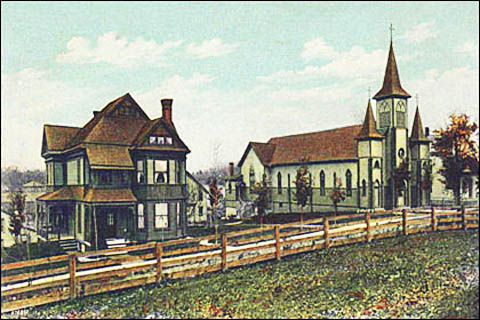
READINGS IN EARLY MORMON HISTORY
(Newspapers of New York)

Otsego Co., N. Y. Newspapers
1870-99 Articles

St. Joseph's Church at Richfield Springs, N.Y. (early photo)
1795-1825 | 1826-1850 | 1851-1869 | 1870-1899 | 1900-1999
| WEST NY | BATAVIA | ROCHESTER | PALMYRA | EAST NY |
| 1829-31 | 1829-31 | 1829-31 | 1829-31 | 1829-31 |
| 1832-33 | 1832-39 | 1832-33 | 1832-33 | 1832-39 |
| 1834-39 | 1834-39 | 1834-39 | ||
| 1840-46 | 1840-46 | 1840-46 | 1840-46 | 1840-46 |
RSM Nov 06 '75 | RSM Feb 16 '88 | OtF May 05 '88 | OtF May 19 '88
OtF Nov 23 '89 | OtF Nov 14 '90 |
News Articles Index | New York City Papers | Otsego Spalding resources
 Vol. X. Richfield Springs, N.Y., Saturday, November 6, 1875. No. 17. 
==> The President has removed the Mormon postmaster at Ogden, Utah. The fact of his being a polygamist is taken as an indication that the President will remove all Mormons holding federal offices. This policy, together with numerous other [inferences -----] will ere long break up the Mormon hierarchy. |
 Vol. XXII. Richfield Springs, N.Y., Thursday, February 16, 1888. No. 35. 
Sydney Rigdon, son of that Sydney Rigdon who is accredited with the founding of Mormonism, is station agent at Carrollton, Cataraugus county, N.Y. |
 Vol. XI. Cooperstown, N.Y., Saturday, May 5, 1888. No. 18. 
Value of Home Markets.
The market for our products of all kinds we have for sale is a first necessity for success. That on the average we Americans have one of the best, if not the best, market in the world, is proven by the anxiety of all other nations to avail themselves of it.... |
 Vol. XI. Cooperstown, N.Y., Saturday, May 19, 1888. No. 20. 
|
 Vol. ? Cooperstown, N.Y., Saturday, Nov. 23, 1889. No. ?  The Mormons. Salt Lake City, Nov. 15. -- On February 10 next, there will be a municipal election here, which will be the first contest between Mormons and Gentiles for supremacy in this city. Both sides have made a thoro' canvass and ascertained that there are many non-naturalized men eligible to citizenship. It is alleged that the Mormons have brought in colonizers, and among these are many aliens. For several weeks past the'court has been daily employed making new citizens. Last Friday, a Mormon named John Moore made application for admission to citizenship. He swore that he was a Mormon, and had been thro' the endowment house. Objection was made to his admission on the ground that parties going through that bouse were compelled to take an oath which was incompatible with their becoming good law abiding citizens of the United States. After arguments, the court stated that it would grant a continuance till Noyember 14, to hear evidence on that point. Meanwhile other applicants for citizenship who were Mormons had their cases continued till this matter could be settled. The objectors claim that if they can prove that Mormonism is a treasonable organization; any man who belongs to and supports that organization, even tho' he never took an oath in the endowment house, is not a fit subject for citizenship. The position taken by the objectors created great excitement among all classes of people, and yesterday when John Moore's case came up the court was crowded. The witnesses were all gray-haired and could have no object in testifying to anything but the truth. John Bond told how he went thro' the endowment house in Jan., 1868, and took certain oaths. In room 5 he took an obligation to obey the priesthood in everything temporal, spiritual, political, social and financial. The penalty for violating the oaths or divulging them was death by cutting the throat from ear to ear, and cutting out the heart and tongue and disemboweling. In the endowment house he solemnly swore that he would avenge the blood of Joseph Smith, the first president and prophet of the Mormon church of the American nation, and that he would preach the same to his children and his children's children for ever, to begin and carry out hostilities against this nation, and keep the same a profound secret. He obligated himself to sustain the doctrine of polygamy, and all the women agreed that they would not oppose their husbands should they desire to take unto themselves more wives. Fifty men and women went through the marriage ceremony on the day Bond did, and Wilford Woodruff, present president of the Mormon church, officiated. |
 Vol. V. Cooperstown, N.Y., Friday, November 14, 1890. No. 46. 
Mormonism, Its Rise and Leaders.
It is not generally known that Joseph Smith, the prophet and father of Mormonism, was a native of the Susquehanna valley in our own state, and an adjoining county. Such I believe to be the fact. In the latter part of the decade of 1866, while engaged in constructing the A. & S. railroad, and while riding with the late Riley Bush of Nineveh, between that place and Centerville, he pointed out to me a mound which he said was the foundation of the chimney of the house in which Joseph Smith, was born. |
Back to top of this page.
Articles Page | Articles Index | History Vault
Oliver's Bookshelf | Spalding Library | Mormon Classics
last updated: Mar. 11, 2009